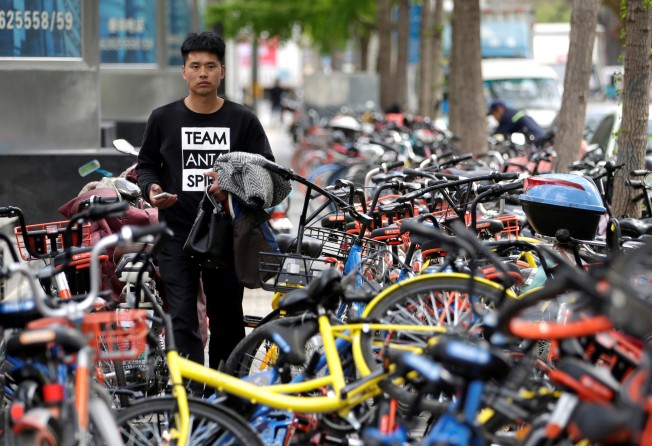
How Hellobike is beating Mobike and Ofo in China’s smaller cities
About 72 per cent of bike-sharing users in China can be found in the country’s second- and lower-tier cities

The bike-sharing war in China is not ending any time soon. The country’s bike-sharing market is forecast to add another 167 million users between 2017 and 2019 to reach 376 million customers, with most of that growth happening outside the top-tier cities of Beijing, Shanghai, Guangzhou and Shenzhen.
While domestic market leaders Mobike and Ofo are making a push into smaller cities, the country’s third-largest bike-sharing service provider, Hellobike, already has a head start.
Launched in late 2016, about two years after Beijing-based rivals Mobike and Ofo started operations, Hellobike was the first bike-sharing operator to build up its business in China’s smaller cities. The start-up has also deployed its bikes in tier-1 cities, but these locations are not its priority.
“At least 100 small cities have yet to see dockless bikes enter [into service],” Hellobike chief operating officer Han Mei told Tech in Asia at the TechCrunch Hangzhou event earlier this month. “These are the markets that we want to crack next.”
Headquartered in Shanghai, Hellobike currently operates in 220 cities across China. Mobike, by comparison, is present in 176 cities, 11 of which are overseas. Ofo has operations in 250 cities around the world.
The number of users with Mobike and Ofo still outnumber those of Hellobike by huge margins as of May, thanks to those two companies’ continued dominance in large population centres. That is not the case, however, in China’s less crowded, less prosperous areas. Hellobike has racked up about half of the users in the second- and third-tier cities, according to data-monitoring firm Trustdata.
About 72 per cent of China’s bike-sharing users are from China’s second- and lower-tier cities, while those in the first-tier cities account for 28 per cent of that market, Trustdata said. The low-tier cities, which are typically behind the major cities in adopting new trends, are expected to see more dockless bikes in service.

More effort, for example, is needed to rebalance the fleet of bikes deployed and the number of maintenance crew in the low-population areas because users tend to be more spread out. In a tier-1 city, bikes are often the last-mile solution between transit stations and destinations. But in a smaller city, a bike ride can easily cover the whole journey.
Although Hellobike’s rivals “have a first-mover market advantage, China is an enormous country”, Jixun Foo, a managing partner at GGV Capital, said in a statement. The US-based venture capital firm was one of Hellobike’s early investors.
“[Hellobike’s] competitors did go after some of the second-tier cities, but there were many cities that they didn’t cover,” Foo said.
The expansion strategy of Hellobike has resonated with other bike-sharing providers amid fierce competition in the major cities.
At least 100 small cities have yet to see dockless bikes enter [into service]
Many of these competitors sharpened their focus last year on China’s low-tier cities, as business in major cities reached a saturation point, according to a report from the China Academy of Information and Communications Technology, a scientific research institute under the Ministry of Industry and Information Technology.
The penetration rates of bike-sharing apps last year across China climbed to 10 per cent and six per cent, respectively, in second-tier and third-tier cities, compared with an average of below two per cent the previous year, according to Shenzhen-based data services provider Jiguang.
Hellobike, whose second-largest shareholder Youon sells bikes to local governments, has forged close ties with local authorities, as the bike-sharing sector has come under greater regulatory scrutiny in China.
Many local government officials want bike-sharing providers to help in their low-carbon transition programmes. As a result, Hellobike had been invited to launch its service in places such as Dongying, Zhenjiang, and Binzhou – all prefecture-level cities, each with a population of under five million. Beijing, in contrast, had a total population of 21.7 million last year.
Hellobike was mostly seen as an underdog in the bike-sharing market until its tie-up with Ant Financial Services, operator of online payments platform Alipay. The financial technology behemoth, in which e-commerce giant Alibaba Group Holding has a 33 per cent stake, made its first investment in Hellobike last December. New York-listed Alibaba, the parent company of the South China Morning Post, is an investor in Ofo.
Ant became Hellobike’s largest shareholder in May after bankrolling the start-up with a US$321 million funding.
Following that transaction, Hellobike’s value has reached about US$2.3 billion, according to company COO Han. Ofo was reportedly valued at US$3 billion last December, while Mobike was acquired by Tencent Holdings-backed on-demand local services provider Meituan-Dianping in a deal worth US$3.4 billion in April.
Ant’s help went beyond writing cheques. Last April, Hellobike’s service became available through Ant’s Alipay e-wallet, so users no longer had to download the start-up’s stand-alone app. Hellobike has not disclosed exactly how much traction Alipay has generated, but Han said Ant was “very valuable” to its “online user acquisition”.
“Alipay has an enormous user base and society-wide influence,” she said. “For a new user, using Alipay [to access Hellobike] is more convenient. So when we enter a new city, we usually promote [the use of] Alipay first.”
Alipay’s 650 million users, however, are not exclusive to Hellobike. Ofo and four other bike-sharing service providers are also accessible through Alipay. Mobike is available on Tencent’s massively popular messaging and social media app WeChat, which has its own payments platform called WeChat Pay.
Speculations about Hellobike’s potential merger with Ofo have been circulating as the two increasingly find themselves vying for the same piece of small-city pie. Han said Helllobike “has paid little attention to the rumour”.
“If your team and business are good enough, you have a bigger say in deciding these [matters],” she said.
In March, Hellobike took another aggressive step in its expansion efforts. The bike-sharing firm did away with deposits for all its users who scored above 650 in Ant’s Sesame Credit system. Ant’s financial support ensures that Hellobike will not be cash-strapped without customer deposits.
The company’s bet has paid off. Within two months, Hellobike’s registered users jumped 70 per cent to gain a 25.7 per cent share of new users in the country’s bike-sharing market between January and May this year. Ofo and Mobike were still ahead with shares of 39.5 per cent and 28.8 per cent, respectively.
For Ant, Hellobike’s move fits nicely with its broader push for a “deposit-free sharing economy” by deploying its Sesame Credit among consumers. In November last year, Ant announced a US$152 million fund to help companies waive customer deposits. Local regulators have also been calling a halt to deposits amid widespread misuse of customers’ money.
Hellobike’s deposit-free scheme is hardly unique. To win new users, Mobike cancelled its US$45 deposit for all customers in China this month – with no conditions attached.
[Hellobike’s] competitors did go after some of the second-tier cities, but there were many cities that they didn’t cover
In contrast, Ofo rescinded a deposit-free programme in 20 cities last May, but told media outlet Caixin that “it doesn’t currently plan to do away with the 199 yuan [US$30] deposit”.
Ofo’s decision resulted in speculation about a cash crunch at the company. Mobike and Hellobike are under the same pressure. Similar to the bike-sharing subsidy frenzy, deposit-free programmes are capital-intensive. Mobike has yet to turn a profit, according to Meituan-Dianping’s initial public offering prospectus.
Hellobike has not revealed how close it is to profitability, but Han suggested that location-based advertising represents a “very good revenue source”.
“For instance, if you’re 500 metres away from a bank, the nearby businesses will push coupons to you [through Hellobike’s app],” she said. “A lot of companies are willing to pay for this service because the targeting is very precise. The potential audience size is big and acquisition costs are low.”
Despite Hellobike’s head start in China’s smaller population centres, Mobike and Ofo still “have the chance” to topple their rival as these two firms ramp up their expansion in tier-3 and tier-4 cities, according to Yu Xue, research manager at IDC China.
The two bike-sharing front runners have started advertising aggressively to potential users through their apps and on bike frames – efforts that could bring in more revenue and counter Hellobike’s presence in the smaller cities, Yu said.
Like Mobike and Ofo, Hellobike is also planning to deploy electric bikes to diversify its income source, boost its commute options for users and mount a new challenge to China’s ride-hailing market leader, Didi Chuxing. Electric two-wheelers will “indirectly replace the need of [hailing rides from] Didi” in journeys between five and 10 kilometres, GGV’s Foo said.
“Didi will also have to figure out how to deal with [the emergence of electric bikes],” he said.